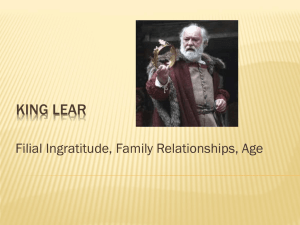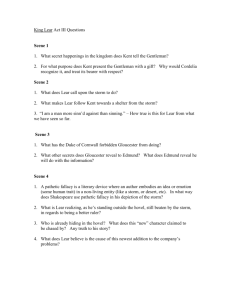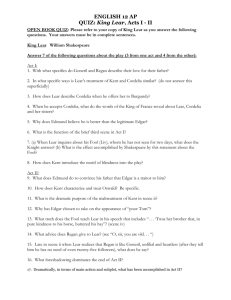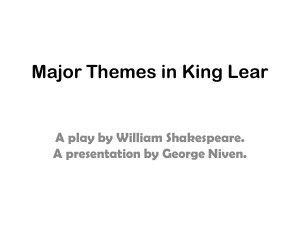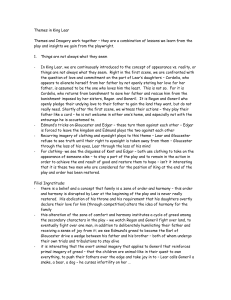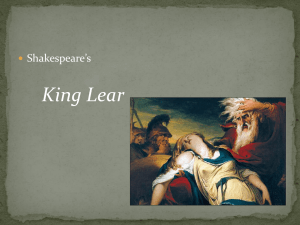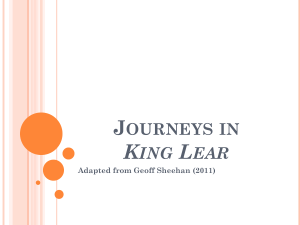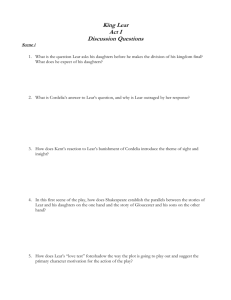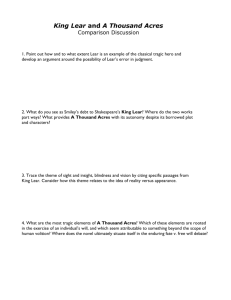SWBAT Explicate Edmund's opening soliloquy and understand his
advertisement
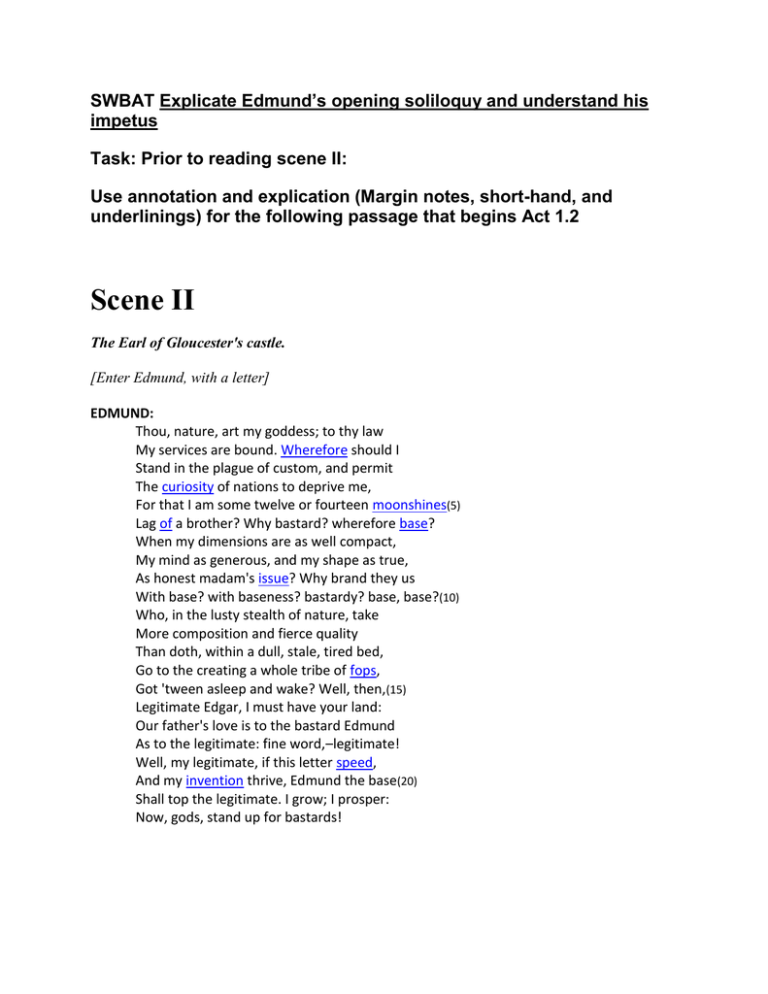
SWBAT Explicate Edmund’s opening soliloquy and understand his impetus Task: Prior to reading scene II: Use annotation and explication (Margin notes, short-hand, and underlinings) for the following passage that begins Act 1.2 Scene II The Earl of Gloucester's castle. [Enter Edmund, with a letter] EDMUND: Thou, nature, art my goddess; to thy law My services are bound. Wherefore should I Stand in the plague of custom, and permit The curiosity of nations to deprive me, For that I am some twelve or fourteen moonshines(5) Lag of a brother? Why bastard? wherefore base? When my dimensions are as well compact, My mind as generous, and my shape as true, As honest madam's issue? Why brand they us With base? with baseness? bastardy? base, base?(10) Who, in the lusty stealth of nature, take More composition and fierce quality Than doth, within a dull, stale, tired bed, Go to the creating a whole tribe of fops, Got 'tween asleep and wake? Well, then,(15) Legitimate Edgar, I must have your land: Our father's love is to the bastard Edmund As to the legitimate: fine word,–legitimate! Well, my legitimate, if this letter speed, And my invention thrive, Edmund the base(20) Shall top the legitimate. I grow; I prosper: Now, gods, stand up for bastards! EDMUND: This is the excellent foppery of the world, that, when we are sick in fortune—often the surfeit(115) of our own behavior,—we make guilty of our disasters the sun, the moon, and the stars: as if we were villains by necessity; fools by heavenly compulsion; knaves, thieves, and treachers, by spherical predominance; drunkards, liars, and adulterers, by an enforced obedience(120) of planetary influence; and all that we are evil in, by a divine thrusting on: an admirable evasion of whoremaster man, to lay his goatish disposition to the charge of a star! My father compounded with my mother under the dragon's tail; and my nativity was under Ursa major;(125) so that it follows, I am rough and lecherous. Tut, I should have been that I am, had the maidenliest star in the firmament twinkled on my bastardizing. Edgar— [Enter Edgar] And pat he comes, like the catastrophe of the old comedy: my cue is villainous melancholy, with a sigh(130) like Tom o' Bedlam. O, these eclipses do portend these divisions! fa, sol, la, mi. Answer the following questions for Act 1.2-5 1.2 1. Read Edmund's soliloquy (1.2.1-22) carefully. What do we learn about him and his plans? What does he seem to mean by the word "nature"? What is he planning to do? What device has he already prepared? 2. How does Edmund get his father to read the letter? Does anything in 1.2.30-35 sound familiar? 3. What does "Edgar" say in the letter? Who really wrote the letter? Are you surprised at Gloucester's response in 1.2.71-72 to what Edmund said in 1.2.67-70? Does Gloucester mean the same thing by "natural" (based on his use of "unnatural" in 1.2.72) as Edmund means by the word? 4. What explanation for the strange events happening does Gloucester give in 1.2.96-108? By now, what does he believe about Edgar? Based on how much evidence? How does Edmund, in his soliloquy (1.2.109-125), respond to what Gloucester has just said? What is his view of the nature of humanity (he would say "man") and the universe? (Or is it unfair to him and to "humanity" to modernize "whoremaster man" as "whoremaster humanity" when he's obviously thinking only of males as "man"? But then, what about Edmund's mother-or is it unfair to assume a willingness on her part when her partner was either a lord or, at that time, the son of a lord? How likely is it that she was of the same social rank? See how easy it is to start "deconstructing" a text when we start asking questions the author didn't expect us to ask?) 5. How easily does Edgar fall for Edmund's plot? What does Edmund try to make Edgar believe has happened? Why does Edmund expect that Edgar can be manipulated by Edmund's obviously hypocritical (to us, given his most recent soliloquy) use of the same astrological "evidence" that Gloucester made use of? 1.3 1. What problems is Goneril having with Lear and his knights? What does she tell Oswald to do about it? What does her plan seem to be? At this point, how justified does she seem in what she's doing? 1.4 1. Why is Kent here? How is he dressed? How is he talking? (See 1.4.1-2.) What does he want? How successful is he? 2. How are things going at Goneril's? Do her complaints of 1.3 seem borne out or not? How does Lear treat Oswald? (See especially 1.4.41, 43, 45, 67-78.) 3. What has recently happened to change the Fool? (See 1.4.61-63, 148.) What message is the Fool trying to give to Lear? Does 1.4.111-114 sound familiar? (Compare 1.4.162-164, 167-169.) And note 1.4.205-206. 4. What does Goneril ask Lear to do in 1.4.222-227? Given her description of the knights in the lines just before these, and earlier in the scene, is this a reasonable request? How does Lear respond to it (1.4.227-230)? What version of "Nature" does Lear call on in 1.4.252? Where is he going? What has he discovered by 1.4.271-272? 5. Where does Goneril send Oswald at the end of the scene? What is he taking with him? 6. Albany first enters at 1.4.232.1 and remains onstage until the end of the scene. How would you characterize him based on what he does and says in this scene? 1.5 1. Where does Lear send Kent/Caius at the beginning of the scene. What is he taking with him? 2. Whom is Lear referring to in 1.5.20? What is he beginning to realize? What does he also feel is beginning to happen? (See 1.5.38-39.) AP Literature Mr. Polanco King Lear Homework Assignment: Close Reading of Act 2 Due date:_________________ Directions: Type and submit on time. Make sure you answer each question thoroughly and clearly. If you have a question about a term, be resourceful: GOOGLE!!! Finally, remember to quote heavily (though not at great length) in your explanations in order to illustrate your point. Your work will be graded. 1. List Kent’s significant nouns and adjectives in 2.2.14-24. Check the liner notes in your text. Consult a dictionary to determine which of these words are still in use. Which have different connotations in modern English? Cite the five or six with the most striking differences. 2. What is the tone of Kent’s speech in lines 14-24? How do the long catalog of his wellchosen insults and the hyperbole of this outburst produce this tone? How does Kent characterize Oswald in lines 28-43 and on what is this description based? 3. In 2.4 Lear has set off for Cornwall’s castle, assuming that Regan will be more respectful than her sister. Why does Lear travel to Gloucester’s house? Why is he so enraged to find Kent in the stocks, and why does he send Gloucester into the castle? 4. What do we learn of Gloucester’s character when he speaks of the “fiery quality of the duke?” Why does this description newly enrage Lear? Which of Lear’s assumptions are overturned in this scene? How does Lear’s language reveal his reaction to his new circumstances? (lines 95-119) 5. The Fool, when he sees Kent in the stocks, proves wise enough to understand the reversals of fortune in the kingdom. His advice to Kent takes the form of rhymes and proverbs. Notice the use of iambic trimeter in the short, rhyming lines of the Fool’s first speech. The second speech is in prose, while the third has alternating lines of tetrameter and trimeter. The little poems pass down the proverbial wisdom in memorable form. a. Paraphrase the proverbial wisdom that the Fool dispenses in the first little rhyme. Why is it appropriate to compare Fortune to a whore? What is the Fool’s purpose in sharing this wisdom with Kent? How do his words relate to Lear’s situation? b. In the third passage, lines 84-92, the Fool rejects his own advice. Compare the behavior of the servant described in lines 84-88 with that of the Fool. Explain the paradox in lines 91-92. 6. In 2.4 Lear responds with indignation to Regan’s demands. She has ordered him to ask Goneril’s forgiveness and return to her with half his knights, and also with restraint and formality. Paraphrase his response. How do Lear’s rhetorical questions, diction, and use of hyperbole confer dignity on the old man? Why are the knights so important to him? What is the basis of his pride? 7. Paraphrase Lear’s speech in 2.4.305-325. How reasonable do you find his argument? 8. Scansion Scansion involves the division of lines into feet in order to determine the meter. It is important to scan a passage, exaggerating the rhythm to discover the underlying pattern of stresses or accents. Remember, most of the lines will be written in iambic pentameter of blank verse. (Reminder: an iamb is an unstressed syllable followed by a stressed syllable: x /). Note any variations of the norm, which are often crucial cues to meaning. Reread Lear’s speech in 2.4.305-325. Analyze the repetition and caesura in the speech. Look for the trochee (/ x) in line 315and the spondees (/ /) (/ /) in line 320. To what effect are they used? Explain.
